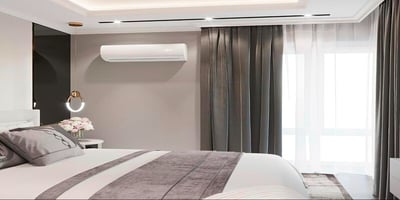Why Does Your Air Conditioner Turn Off by Itself? 5 Main Reasons
We've all been there! Nothing can be more maddening than arriving home on one of those blistering summer days, flipping your air conditioner on, and only having it turn off by itself. Oh no! That cool comfort you were otherwise looking forward to will fade out real quick, and you're left wondering what could possibly be going wrong. This is an extremely common problem but can sometimes be something more than a simple matter of annoyance. It might point out certain underlying issues that do require attention. In this article, we're going to look at the five main reasons your air conditioner might be shutting down on its own and what you can do about it.
Reason 1: Thermostat Issues
Know that your thermostat is normally a prime suspect when your air conditioner turns off for no obvious reason. It's technically the brain of your HVAC system, letting the AC unit know how to turn on and off according to the temperature it senses across your home. In case it is faulty or miscalibrated, it might send a shut-off signal to the AC before it reaches the desired temperature in the room.
One of the common problems is incorrect settings. For instance, if the thermostat is set to allow the temperature to rise higher than desired, the AC turns off once that temperature is reached. Other issues might have to do with the thermostat being placed poorly. If it is located near a heat source, such as a sunny window or a device that gives off warmth, it could fool the thermoregulator into thinking the room is warmer than it really is, thus cycling off the AC too early.
First, check your thermostat settings to confirm they are correct. In some extreme cases, you may simply need to move the thermostat to a more central location in your home and keep it out of hot spots. These simple steps will let your AC work on an accurate reading of your home's temperature for constant comfort. If you have problems with the reliability of your air conditioner controller, you can choose a new controller here.
.jpg?width=740&height=370&name=photo_2024-08-16_18-38-02%20(1).jpg)
Reason 2: Dirty Air Filters
Another common reason air conditioners may shut off unexpectedly is dirty or clogged air filters. An air filter is installed in the AC system to trap dust, dirt, and other particles in the air before they get into the system and are circulated around the house. Over time, the filter's surface gets clogged, hampering proper airflow into the AC.
This limited airflow makes the air conditioning unit heat up as it struggles to cool your house. Then, to avoid further damage or even a fire risk, the unit's internal safety mechanisms often cause it to shut down. It's a proper protective measure, but it's a drag when you're trying to cool the home on a hot day.
Do this through regular maintenance on your air filters to avoid the need to replace or clean them within one to three months, which must be done, however, depending on the type of filter your system uses. On the other hand, if maintenance on this point is neglected, more serious issues can include reduced cooling efficiency, higher bills for energy use, and possibly even damage to the air conditioning unit itself. Ensure that the air filters are well maintained, which will result in the right quantity of airflow that the air conditioner requires to operate effectively and efficiently.
Reason 3: Refrigerant Leaks
The air conditioner will shut down if there are problems with service components such as circuit coolant or compressor oil. Freon in the air conditioner should be a certain amount. If it is too low or vice versa overstated, it will lead to system failure and sudden shutdown. The same applies to oil that may already be used or is of poor quality, which harms the system. Follow these indicators, and to better understand them, consult with specialists.
For example, if the level of refrigerant runs low, it may have a hard time maintaining the thermostat's desired temperature setting. It may cycle excessively in an attempt to compensate. Not only does that mean the AC is not as effective, but also it puts additional pressure on the system. This could mean more breakdowns and rising energy bills. This may sometimes even shut down the unit when the refrigerant level runs too low. After all, the safety features within this system are working to prevent damage.
If you feel that you may have a refrigerant leak, get somebody to check it out right away. You can never repair refrigerant leaks on your own. An HVAC professional will find the source of your leak and repair it. They'll also charge the system with the proper amount of refrigerant. Fast action on refrigerant leaks will make your AC run better and will help stop other problems.
.jpg?width=740&height=370&name=photo_2024-08-16_18-38-31%20(1).jpg)
Reason 4: Electrical Problems
There's another very common reason why your air conditioner will shut off: electricity problems. The AC system needs the proper flow of electrical current to work. The second part of it fouls up; your electricity will cut out.
Intermittent power loss can be caused by loose connections, frayed wires in the circuit, or even some active electrical components of the AC, such as capacitors and relays, which make the AC turn off on its own. An electrical problem is very tricky to trace because it could be caused by the unit not starting or shutting off by itself while in operation. These electrical issues remain a possible cause of fire when taken lightly and not attended to immediately.
Some of the points that should alert you to seek a professional include the flickering of lights while the AC is on, the breaking of circuits every so often, or it shutting down all of a sudden. An experienced HVAC professional tests on wiring and components identifies faults, and later makes repairs. More critically, spotting and tackling electrical faults proactively can prevent costly damage to your air conditioning system yet guarantee it years of faithful, safe service.
Reason 5: Overheating or Short Cycling
Some common causes of overheating or short cycling in an air conditioner include blocked vents, dirty coils, or a unit that is too small. On the other hand, in cases where the vents are blocked or restricted, it will be under much more work to cool down the space, which may easily result in an AC overheating. Similarly, if the unit is too small with respect to the area it is trying to cool, then it can't reach the desired temperature, which in turn makes it turn on and off repeatedly, a process referred to as short cycling.
Short cycling occurs when your air conditioner turns off before completing an entire cooling cycle. The cause may be that the system reaches the temperature set on the thermostat too quickly and then finds out that the room warms up again rather rapidly. This on/off action can not only disturb the smooth cooling process but also create excessive wear and tear on the AC's components.
.jpg?width=740&height=370&name=photo_2024-08-16_18-39-29%20(1).jpg)
The impact of short cycling on an air conditioner is enormous. This practice diminishes the overall efficiency of the system; hence, it increases energy bills since the unit consumes more power to keep the desired temperature. Constant straining on the system may also lessen its life span, leading to an increase in repairing cycles and probably calling for a total replacement before the anticipated time. Some of the most common ways in which short cycling may be avoided include making sure that vents are not blocked, proper airflow, and proper unit size for your space - all this to keep your AC running efficiently through the years.
Thermostat problems, dirty air filters, refrigerant leakage, electrical problems, overheating, and short cycling can all shut down an air conditioner. By identifying and solving these common issues, you can keep your AC running smoothly and efficiently to provide a cool and comfortable home. Avoiding these small troubles by performing regular maintenance and getting professional help at the right moment will never disturb your comfort.


































.jpg)
.jpg?height=200&name=3888%20(1).jpg)


.jpg?height=200&name=photo_2024-05-10_21-06-06%20(1).jpg)